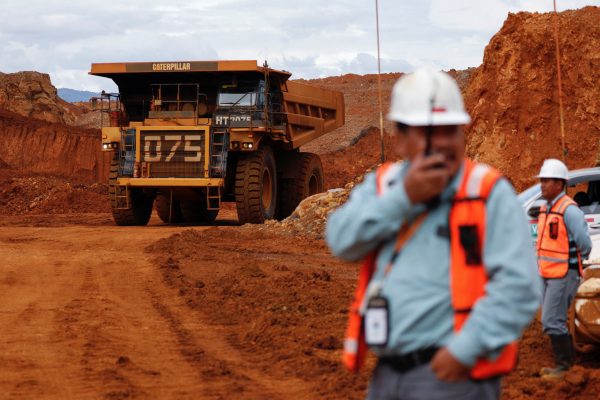The bulk of reserves of these minerals are concentrated in a few nations. Indonesia accounts for 37 per cent of the world’s nickel production, Australia for 55 per cent of lithium and the Democratic Republic of the Congo for 70 per cent of cobalt.
But China holds a dominant position in the processing of these vital minerals, not only within its own borders but also through the ownership or control of critical mineral resources globally. Specifically, it oversees the refinement of 58 per cent of the world’s lithium, 67 per cent of cobalt and 35 per cent of nickel into battery-grade chemicals for cathodes.
The geographic concentration of production and processing of battery minerals, particularly China’s predominance in the processing capacity, adds volatility to geopolitics, in which energy security has always been a paramount concern. Just as coal and oil defined past eras, battery minerals are defining the current era, shaping economic, environmental and diplomatic policies globally.
The recent discovery of vast lithium reserves in Iran shows how quickly the geopolitics of critical minerals can change. This development elevates the stakes for a potential strategic alliance between Australia and Indonesia in building an alternative supply chain for battery minerals. Geographically proximate and with their complementary resources, these nations are well positioned to forge a beneficial partnership.
Such an alliance could serve three strategic purposes — advancing Australia’s ambitions to ascend in the global battery supply chain, building Indonesia as an EV and battery hub, and supporting the US-led Mineral Security Partnership. The pressing questions that emerge are whether this partnership can effectively mitigate the urgent challenges posed by climate change and positively affect recovering relations between Australia and China.
There are many hurdles to overcome for such an alliance to succeed, including long setup times, regulatory and environmental issues and investment needed for capabilities and infrastructures. Currently, only China has managed to establish a complete supply chain to overcome all these hurdles.
An uncertain technological trajectory has added another dimension to the complexity of minerals geopolitics. To mitigate environmental and supply risks, the industry is exploring alternatives to nickel and cobalt, two relatively rare elements in battery minerals. Top Chinese battery manufacturers are developing lithium iron phosphate (LFP) batteries that eliminate the need for cobalt and nickel.
Compared to nickel-manganese-cobalt (NMC) batteries, which have higher energy density but are more expensive and less tolerant of higher temperatures, LFP batteries have seen improvements in energy density and are increasingly used in EVs. Their market share in China grew from 38 per cent in 2020 to 66 per cent in the first half of 2023. This shift not only alleviates security concerns over cobalt and nickel but also diminishes the geopolitical leverage of countries rich in these minerals.
Battery minerals, including nickel and cobalt, are commodities whose value is determined by the dynamics of supply and demand. While resource depletion is not an immediate concern, there is a perceived scarcity. This scarcity stems more from a race to stockpile reserves as a strategy to minimise geopolitical and supply chain risks, rather than an actual shortage.
From a geopolitical standpoint, China’s lead in clean energy technology is perceived as a challenge to the global energy security. This viewpoint has caused concern among US policymakers. Geopolitical tensions and distrust among nations with different ideological values are exacerbating a race to secure these materials. This race could disrupt the global supply chain and potentially hinder global efforts to meet the carbon reduction targets set by the Paris Agreement.
In this context, a prospective alliance between Australia and Indonesia holds special appeal for the United States. Given the uncertain future of battery technology, the proposed alliance also raises substantial concerns. Both Australia and Indonesia lack the key technologies necessary for minerals refinement, waste management and battery manufacturing. In addition to considerable investments in infrastructure and manufacturing facilities and high environmental costs, the alliance raises more questions than solutions concerning its efficacy in addressing pressing climate change issues without China’s involvement.
Initiating such an alliance could also potentially strain the recuperating relations between Australia and China. This is largely due to China’s extensive investments in the mineral processing industries of both Australia and Indonesia, coupled with its strong desire to maintain its established position.
China’s lead in battery technology, on the other hand, could be a global asset in facilitating decarbonisation. Contrary to common belief, China’s lead in the battery supply chain is more a result of private-sector innovation than state-backed investment. Leading companies like Ganfeng, Tianqi, CATL and BYD are non-state enterprises and have thrived in intense domestic competition.
While establishing an alternative battery supply chain would enhance diversity and strengthen the resilience of the existing supply infrastructure, there is a risk that such initiatives might be weaponised in a way that could destabilise the unified global approach to decarbonisation.
To promote a successful alliance between Australia and Indonesia in creating an alternative battery supply chain, it is crucial to involve all tech-forward nations, including China, as key players. Open global trade and investment stand as pivotal strategies in the fight against climate change. But achieving this requires transcending prevailing political and ideological differences to foster cooperative alliances, rather than pursuing partnerships based strictly on like-mindedness.
Marina Yue Zhang is Associate Professor at the Australia-China Relations Institute, University of Technology Sydney.

